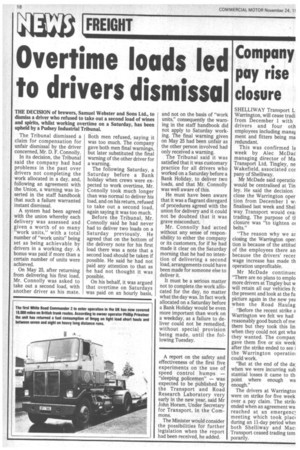Overtime loads led to drivers dismissal
Page 20

If you've noticed an error in this article please click here to report it so we can fix it.
THE DECISION of brewers, Samuel Webster and Sons Ltd., to dismiss a driver who refused to take out a second load of wines and spirits, whilst working overtime on a Saturday, has been upheld by a Pudsey Industrial Tribunal.
The Tribunal dismissed a claim for compensation for unfair dismissal by the driver concerned, Mr. D. F. Connolly.
In its decision, the Tribunal said the company had had problems in the past over drivers not completing the work allocated in a day, and, following an agreement with the Union, a warning was inserted in the staff handbook that such a failure warranted instant dismissal.
A system had been agreed with the union whereby each delivery was assessed and given a worth of so many "work units," with a total number of "work units" being set as being achievable by drivers in a working day. A bonus was paid if more than a certain number of units were achieved.
On May 25, after returning from delivering his first load, Mr. Connolly was asked to take out a second load, with another driver as his mate. Both men refused, saying it was too much. The company gave both men final warnings, but later substituted the final warning of the other driver for a warning.
The following Saturday, a Saturday before a Bank holiday when crews were expected to work overtime, Mr. Connolly took much longer than was normal to deliver his load, and on his return, refused to take out a second load, again saying it was too much.
Before the Tribunal, Mr. Connolly said he had never had to deliver two loads on a Saturday previously. He agreed that on the bottom of the delivery note for his first load there was a note that a second load should be taken if possible. He said he had not paid any attention to that as • he had not thought it was possible.
On his behalf, it was argued that overtime on Saturdays was paid on an hourly basis, and not on the basis of "work units," consequently the warning in the staff handbook did not apply to Saturday working. The final warning given on May 25 had been unfair as the other person involved had only received a warning.
The Tribunal said it was satisfied that it was customary practice for all drivers who worked on a Saturday before a Bank Holiday, to deliver two loads, and that Mr. Connolly was well aware of this.
He must have been aware that it was a flagrant disregard of procedures agreed with the union for delivery and it could not be doubted that it was grave misconduct.
Mr. Connolly had 'acted without any sense of responsibility to either the company or its customers, for if he had made it clear on the Saturday morning that he had no intention of delivering a second load, arrangements could have been made for someone else to deliver it.
It must be a serious matter not to complete,the work allocated for the day, no matter what the day was. In fact work allocated on a Saturday before a Bank Holiday would be even more important than work on a weekday, as a failure to deliver could not be remedied, without special provision being made, until the following Tuesday.




















































































































